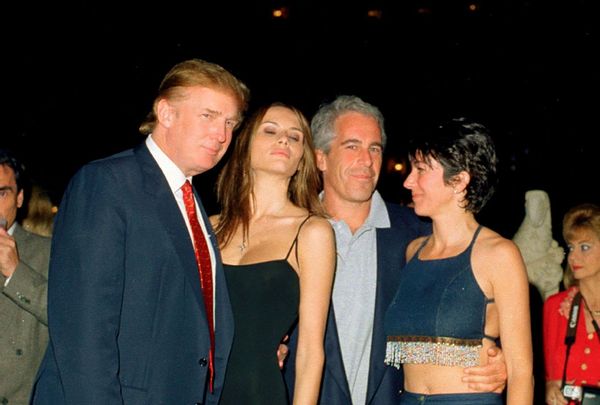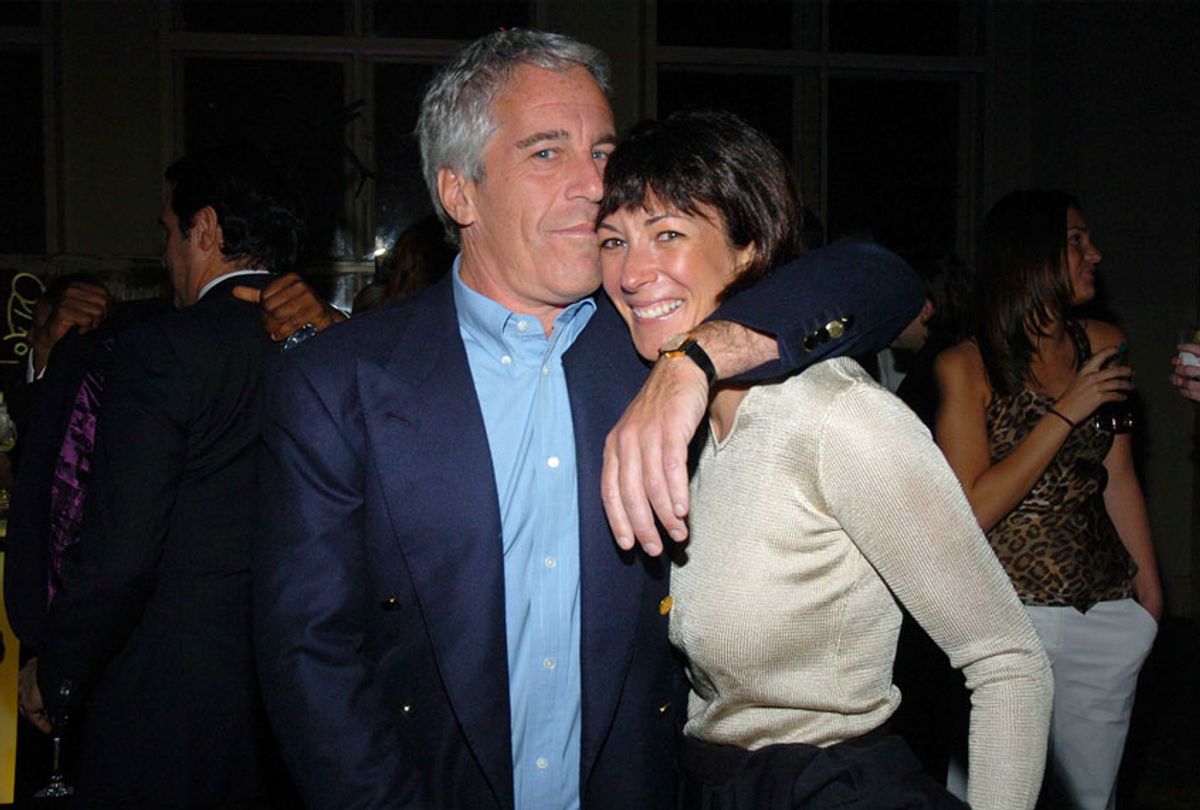When Jeffrey Epstein was at the height of his power and seemed untouchable, he and his web of enablers, including Ghislaine Maxwell, reportedly were trafficking five or six girls a day.
"Surviving Jeffrey Epstein," Lifetime's new four-hour documentary, demonstrates how this was an open secret in his social circle, a sphere of influence that expanded to include some of the world's wealthiest and most recognizable people.
Enough knew enough about his predatory habits that at his 40th birthday party, when British journalist Christopher Mason recited a custom-written composition at his former friend Maxwell's behest, a telling moment seared itself into his memory.
"He taught math at Dalton: The naughty boy blushes/ To think of schoolgirls and all of their crushes," he had read aloud to a roomful of people, some of whom snickered.
"It seemed like that was something that was known about him at the time, that he liked younger girls," Mason says in the documentary, after admitting that in the context of what the world knows about Epstein now, his bawdy little ditty reads a good deal creepier. "It's that odd thing of something that seems tongue in cheek, but you have no real sense of how utterly depraved his intentions were."
"Surviving Jeffrey Epstein," as the title implies, follows in the path of Lifetime's previous documentary "Surviving R. Kelly" in granting a safe, supportive forum to the eight women who agreed to go on camera and recount their stories of being sexual exploited by Epstein and Maxwell, including Virginia Giuffre, perhaps the most prominent accuser associated with this case.
Filmmakers Annie Sundberg and Ricki Stern edited these four hours in a way that locks our focus on the lives and bravery of these survivors, capturing their determination and refusing to turn the lens away from moments in which the lasting ache of what they've gone through and continue to live with surfaces anew.
"From our perspective, the women themselves and their stories are so specific and so clear, and caused them so much trauma," Stern told Salon in a recent phone conversation. "This isn't an easy thing for them to come forward and share these stories. They're certainly not doing it for fame or fortune. They're doing it because they want to hopefully prevent this from happening to some other young person and also to hopefully change the laws so that people who have been sexually abused won't be up against these timelines of statute of limitations."
Epstein was found dead in his Manhattan jail cell on August 10, 2019, and to some it would seem that this series arrives too late, coinciding with that one-year anniversary. (Netflix already traversed similar territory, albeit in more lurid fashion, in its docuseries "Jeffrey Epstein: Filthy Rich.")
But what Sundberg and Stern argue quite powerfully over the course of their series' four parts is that the only way that the world's most prolific serial sex offender and child molester could have operated so successfully, and trafficked girls from around the globe for so long without facing consequences, is that he didn't operate on his own.
Maxwell was taken into custody on July 2 of this year. And it is her involvement that constitutes the main thrust of the fourth episode, which builds that case that even though Epstein's death denied these women justice, they may get their day in court to confront Maxwell.
"What made ["Surviving R. Kelly] notable was the series itself helped lead to charges. It really helped effect criminal justice repercussions," Stern said. "We feel in some ways that we have some traction now with that, especially with the focus on Ghislaine in the fourth episode. And I think with her trial and the case pending, everyone will be curious to see now if there'll be additional charges that will be laid against some of the people who have been previously either protected or not named."
Each hour carefully walks us through Epstein's rise to become one of the world's richest men while carefully refraining from humanizing him. Instead, the documentary closely examines the means by which the New York financier corrupted and successfully circumvented the justice system for most of his life.
Stern and Sundberg also lay out the web of co-conspirators named in a 2008 federal case brought against him, including Sarah Kellen, Nadia Marcinkova, Lesley Groff ,and Adriana Ross, none of whom have ever been charged with a crime, and Jean-Luc Brunel, a former modeling agency scout who has denied any wrongdoing and, like the others, has not been charged with any crime.
Every episode includes multiple reminders to viewers of each named co-conspirators insistence on their innocence, including a card from Kellen identifying her as a "potential co-conspirator" in a non-prosecution agreement between federal prosecutors and Epstein in 2008 that adds,
Her spokesperson told CBS News she was "sexually" and "psychologically" abused by Epstein for years, and "deeply regrets" any part in "the pain and damage Epstein caused." She has not been charged with any crime.
But Sundberg and Stern are unsparing in terms of pointing out, by way of survivor testimony and ample photographic evidence, how many famous, powerful people were close enough to Epstein and Maxwell to have some idea of what was going on, and yet did absolutely nothing about it.
An extensive array of photographs are woven throughout the series showing Epstein and Maxwell with their arms slung around a jaw-slackening array of public figures. You will recognize Bill Gates, Elon Musk, Bill Clinton, Prince Andrew, and Naomi Campbell, and many, many party pictures of the pair being chummy with Donald Trump.
Giuffre first came forward in 2014 and alleged that she had been trafficked by Epstein and Maxwell over the course of several years and, most shockingly, lent out to friends of theirs, including Prince Andrew and Alan Dershowitz.
Prince Andrew, as far as the filmmakers know, has not been interviewed by the FBI. As of May of this year, he has permanently resigned from all public duties.
However, it is Trump's connection with Epstein that made the latter a household name in 2019. He wasn't known in many circles outside of New York and Hollywood, even though his earlier deal that enabled him to slip free of federal charges – and facilitated between 2007and 2008 by Dershowitz and Trump's eventual Labor Secretary Alexander Acosta, who was then the U.S. Attorney for the Southern District of Florida – made national headlines.
Acosta resigned from his position within the administration last year amid rising criticism over his handling of Epstein's 2008 deal – specifically his agreement that the deal would be kept from Epistein's victims, which is a violation of federal law.

But those photos of Epstein and Maxwell cozied up to Donald Trump and Melania at various parties over the years granted him a new level of national celebrity, and his suspicious death made him even more famous. Plus, long before this docuseries came into existence Trump's quote from a 2002 New York Magazine article recirculated in the news: ""He's a lot of fun to be with. It is even said that he likes beautiful women as much as I do, and many of them are on the younger side."
When it became clear that Epstein was not going to wriggle out of his 2019 arrest and the resulting charges stuck, suddenly Trump claimed wasn't terribly close with the man. A few eyebrow-raising shots in the fourth episode of documents, some with details redacted, tell another story.
Sundberg and Stern stressed in their interview that for most of these people, being seen in photos with Epstein and Maxwell does not mean that whatever relationship each of these public figures had included participation in any kind of sexual abuse or recruitment of young girls. True to that statement, Dershowitz denies, on camera, that he engaged in any sexual activity with any minors as Giuffre accuses him of doing.
Regardless of each person's level of actual culpability, this visual evidence of their relationship with Epstein means, as Sundberg puts it, that each "either knew, felt or sensed" that the whisperings about his criminal behavior had to be true. In a later episode, a representative working for one of Gates' research foundations raised concerns about the foundation accepting money from Epstein, but her protests fell on deaf ears.
"They just didn't think it was their place to say anything, or to question his behavior," Sundberg said. "It's remarkable, whether or not they participated in the abuses."
Stern added that the silence reminded them of the murder of Kitty Genovese, the famous 1964 case that inspired the social psychological theory known as "the bystander effect. "There's this sort of a group mentality of, 'Well, if the president isn't going to call it out, who am I to say something is going on? Who am I to suggest that?"
In this way, "Surviving Jeffrey Epstein" becomes a study of the multiple ways that these women – and the scores of other victims whose names and faces we don't know – were failed by the justice system and the people around Epstein and Maxwell.
Since Sundberg and Stern also are contending with a moving target with this case, that could turn around at a moment's notice. The pair were cutting in relevant material only days ago. That includes Trump's July 210 press conference in which he replied to the question of how well he knew Maxwell with his questionable answer that they were quite familiar, and "I wish her well, frankly."
Any viewer with a conscience will feel the opposite, especially after taking in moments such as one fourth episode glimpse of Maxwell, glamourous in a fiery tangerine-sequined gown, as survivor Rachel Benavidez says in voiceover, "I don't think she has any remorse about what she did. I hope she spends every last day of her life in an orange jumpsuit."
"Surviving Jeffrey Epstein" airs over two nights, with its first half debuting on Sunday, Aug. 9 at 8 p.m.and its conclusion airing at Monday, Aug.10 at 9 p.m. on Lifetime.

Shares